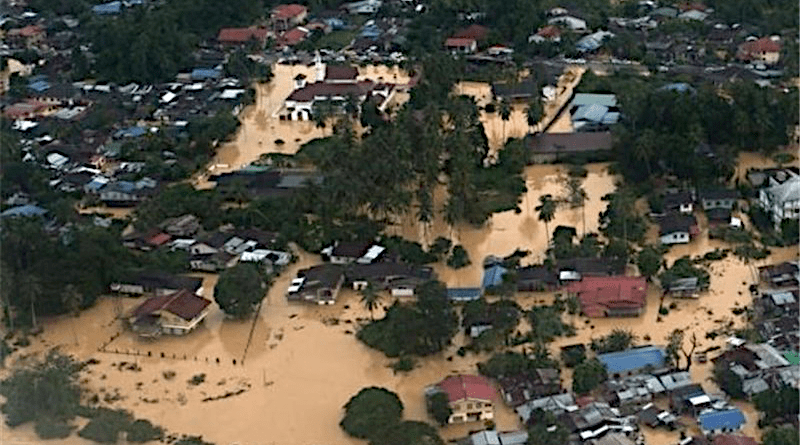Malaysia’s Floods Expose Catastrophic Policy Failure – Analysis
Poor planning, slow response, lack of empathy
The warning last July by Malaysian opposition parliamentarian Nurul Izzah to the government to prepare for the approaching monsoon season went totally unheeded. Now that admonition has come back to haunt a government that has far too long appeared to put the contest for power above the exercise of governance, generating widespread popular reactions of anger.
Amid claims that politicians are benefiting from catering operations to feed people evacuated in some areas, the government has been caught with its pants down over poor planning and response to the disaster. Scenes in parliament of the Dewan Rakyat Speaker Azhar Harun disallowing debate on the flooding have added to the criticism the government lacked empathy for the people suffering in this crisis.
In what is being described as the worst floods to hit Malaysia since 1971, at least 20 people have been reported dead, 10 missing and as many as 64,000 displaced from their homes. Thousands have been stranded on their roofs, some waiting days for rescue. Cases of Covid-19 are rapidly rising in flood relief centers. Markets and supermarkets are drowned under flood waters, particularly in Kuala Lumpur and Selangor, causing many families to go hungry.
Some people are so desperate that supermarkets have been looted, recalling periods during the height of the Covid-19 outbreak when people were hanging white banners outside their homes to signal their need for food and other help. With no warning from the government that flooding would be this severe, anger is at an all-time high.
Eight states, particularly Pahang and the urban capital region Selangor, suffered major flooding that officials have called a once-in-a-century event, beginning on December 14, although devastating floods also occurred in 2014-15, and in November 2010 before that, an indication that government officials have paid no heed to the possibility of such disasters.
Ten percent of the country’s average annual rainfall occurred over a 24-hour period in many locations. Clogged drains and catchment channels were all inadequate for the downpours. Millions of Malaysians have been affected, suffering with what appears to be little empathy coming from the government.
The 2010 floods in the north and east coast of the country aroused some debate about preparing for major floods. Some token projects like the Timah Tasoh Dam to the Kuala Perlis dam runoff channel in the far northwest coastal area were knee-jerk reactions. Due to the lack of flood mitigation studies undertaken before these projects were commenced, it is really unknown how effective they will really be. The 2010 warning didn’t lead to any development of a flood mitigation plan across the country. Today, the nation is sadly seeing the consequences of lack of planning.
Environmentalists in the media are claiming that the floods are the result of climate change. However, poor public policy seems to be a major contributor. Logging in many strategic catchment areas has been going on unabated for decades. Even land cultivated with rubber and palm oil doesn’t have the ground absorbing effect that natural jungle does. Water catchment and drainage infrastructure projects so vital in times like this were bypassed for other infrastructure projects that were commercially lucrative for certain parties. Both the 11th and 12th Malaysian Plans gave little priority to flood mitigation infrastructure.
Road, highway, industrial and urban development lacked the necessary environmental impact studies that would prevent the landslides seen over the last couple of days. Drains in flood prone areas were not cleared in time for the excessive rains.
Likewise, the government has been very slow to respond to emergencies. For the people who have been stranded on the tops of their homes, the Welfare Department (JKM) is making excuses that its role is limited to creating temporary relief centers, and not providing food to people stuck in their homes.
Prime Minister Ismail Sabri Yaakob announced a RM100 million allocation to handle this disaster with RM1,000 going to each household directly affected by the flooding. He also announced that government-linked companies including Petronas, Celcom, Telekom Malaysia, Sime Darby, CIMB, UEM, and Khazanah Nasional would contribute RM 50.8 million to the crisis, a doubling of the announcement he made the day before.
Some are seeing this as a response by disaffected groups tired of the years of political wrangling such as the new Malaysian United Democratic Alliance (MUDA) raising more than RM1 million for flood relief, and other political parties down at the local flood-affected areas handing out aid.
Malaysians themselves have embraced the disaster and are helping others across the country. Some individuals have created their own mini relief centers, others are rescuing stranded people, while others are delivering much needed food. This is all being done without the racial hallmarks of the country’s politics in a spirit of common brotherhood.
The disaster highlights the poor level of governance in Malaysia. A review of the thousands of comments on social media indicate there is a strong sense of feeling totally let down by the government. The floods and perceived poor handling of the Covid-19 pandemic have highlighted the weakness of government in delivering basic safety to the people. It exposes a void in public policy, where many are angry that the government has just not done its job.
Originally published in the Asia Sentinel

